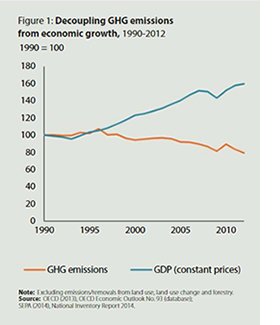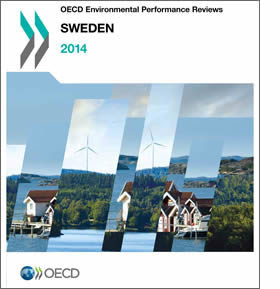 |
      |
| |
European Biomass Conference and Exhibition News No. 58
|
Sustainable Biorefineries: An Important Research Topic |
 |
In recent years, substantial steps into the transition towards a biobased economy have been taken in order to reduce the reliance on imported oil and the emission of greenhouse gases.
 As far as Europe is concerned, Sweden, home to the EUBCE 2017 in Stockholm, has been very successful in decoupling GHG emissions from economic growth: from 2000 to 2012, total GHG emissions decreased by 16% while overall GDP grew by about 30% (Figure 1). As a result, Sweden more than achieved its commitments to reduce GHG emissions, both that made under the Kyoto Protocol and its more stringent national target1. As far as Europe is concerned, Sweden, home to the EUBCE 2017 in Stockholm, has been very successful in decoupling GHG emissions from economic growth: from 2000 to 2012, total GHG emissions decreased by 16% while overall GDP grew by about 30% (Figure 1). As a result, Sweden more than achieved its commitments to reduce GHG emissions, both that made under the Kyoto Protocol and its more stringent national target1.
An important research topic as a substantial part of a sustainable economy are biorefineries.
Biorefinery refers to the facilities, which converts biomass into fuels, power, heat, chemicals and materials, food, and several other useful products. A biorefinery utilises different kinds of biomass, such as agricultural crops, wood, forest residues, algae, sea weeds, and organic residues.
Several types of energy crops, such as woody and herbaceous plants are required to be grown for input in biorefinery. These crops are developed using fertilisers, chemicals for crop protection, and others.
This creates abundant growth opportunities for the market players in chemical industries. Moreover, biomass production also offers abundant opportunities of revenue generation for farmers and companies involved in biomass plantation. Different processes and techniques, such as pyrolysis, gasification, fermentation, esterification, acid hydrolysis and fractionation are used for the conversion of biomass into useful products including energy, chemicals, and materials.
As PR Newswire reports, the global biorefinery market was valued at $ 432.4 billion in 2014, and it is expected to grow with a compound annual growth rate (CAGR) of 14.0% during 2015 - 2020. North America accounted for the largest share in the global biorefinery market with $ 311.3 billion in 2014. The European Union have set target as per Renewable Energy Directive (RED), to fulfil at least 20% of its total energy needs with renewables by 2020. Similarly, the U.S. renewable fuel standard program was created to reduce greenhouse gas emissions and expand the U.S. renewable fuels sector, thus.
In addition, the implementation of stringent environmental regulations across the globe is propelling the demand for efficient renewable energy sources. Several international organizations are framing strict guidelines and standards, in order to reduce the greenhouse gases emission, thus fuelling the growth of the global biorefinery market. However, the requirement of high initial capital investment and uncertain global economic conditions are expected to hinder the growth of the market to some extent.
What about in Sweden?
IEA Bioenergy Task 42 confirms that “Wood as a renewable and sustainable resource offers great opportunities for a comprehensive product portfolio to satisfy the different needs in a future BioEconomy. Worldwide many different wood based biorefining concepts are investigated and realised, of which the development status and the perspectives for implementation are quite different”.
 Sweden, a country with more forest than most other countries – 53 per cent of land cover, compared with the global average of 30 per cent, and about 90 per cent of bioenergy coming from the forestry sector - is trying to lead the way to a more sustainable planet through innovative sustainable solutions. Expenditure on R&D (research and development) represented 3.3 per cent of GDP in 2013, the fourth highest percentage in the OECD. Sweden, a country with more forest than most other countries – 53 per cent of land cover, compared with the global average of 30 per cent, and about 90 per cent of bioenergy coming from the forestry sector - is trying to lead the way to a more sustainable planet through innovative sustainable solutions. Expenditure on R&D (research and development) represented 3.3 per cent of GDP in 2013, the fourth highest percentage in the OECD.
According to the OECD Environmental Performance Review 2014, Sweden is one of the most innovative countries when it comes to environment-related technology. Investments in environmental R&D have made Sweden an innovation leader for several clean energy technologies, including biofuels, smart grids and carbon capture and storage.
As a result of these investments, Sweden has developed a competitive advantage in technologies related to sustainability. In 2014, Sweden ranked fourth in the Global Cleantech Innovation Index and this trend, especially as regards to research on biofuels and chemicals. is also confirmed by many contributions that will be presented at EUBCE 2017.
1OECD (2014), OECD Environmental Performance Reviews: Sweden 2014, OECD Publishing, Paris. DOI: http://dx.doi.org/10.1787/9789264213715-en
EUBCE Discussion Platform |
 |
EUBCE is a perfect forum for the R&D community to discuss the research topics related to biorefineries. While the experience on discussing biomass research for biofuels and biochemicals dates back to the first EUBCE events over 30 years ago, with an increase from the beginning of 2000s, the upcoming event will again have several topics contributing to biorefineries research and applications:
 |
|
Workshop “Future Biorefineries from Raw Materials to Bio-Products: Development and Analysis” on Thursday 15 June 2017, 09:00 - 15:00
|
 |
|
Workshop “BioREFINE-2G: Utilisation of Waste Streams for Bioproducts and Bioenergy” on Monday 12 June 2017, 13:00 - 17:00
|
 |
|
In all sessions of Topic 3.6 Biorefineries and 3.7 Production And Application of Biobased Chemicals, different aspects of biofuels and biobased chemicals production and applications are analysed and discussed.
|
 |
|
In session “Commercialization of Bioenergy and Biorefinery Concepts” on Tuesday, 13 June 2017, 15:15 - 16:45, Session code: IBO.12.
This session deals with challenges to convert biomass to biofuels and biochemicals and presents possible commercial opportunities for innovative biobased products and systems.
|
 |
|
And among the others in the following presentations:
-
Improve Economic Competitiveness of Palm Oil Based Biodiesel in Indonesia through Biorefinery Pathway, Session reference: 4AV.1.27
-
Value Reflective Design Space, an Approach for Incorporating Sustainability in Early Stages of Biorefinery Design, Session reference: 4AV.1.55
-
Environmental Preliminary Results Using LCA Methodology of a Biorefinery Fed with Olive Pruning in Andalusia, Session reference: 4AV.2.23,
-
An Advanced LCA-model Targeted to Bioenergy Systems and Technologies: Recent Developments of the EASETECH LCA-model, Session reference: 4AV.2.40,
-
BioEconomy with Algae - Life Cycle Sustainability Assessment including Biophysical Climate Im-pacts (Albedo) of an Algae-based Biorefinery, Session reference: 4BO.13.1,
-
Microalgae Fractionation Into Bioproducts by Steam Explosion and Membrane Filtration, Session reference: 1CO.1.4,
-
BIOrescue: Enhanced Bioconversion of Agricultural Residues through Cascading Use, Session reference: IDV.3.35,
|
 |
|
See the full EUBCE Conference Programme 2017
|
EUBCE Workshop: Future Biorefineries from Raw Materials to Bio-Products: Development and Analysis |
 |
Thursday 15 June 2017 09:00 - 15:00
The workshop will host contributions on biorefinery development projects.
The inspiring principle is that not only technology development, but also process integration, life cycle and environmental impact analyses must be considered in the design and realization of future sustainable biorefineries. The event is hosted by the BioBuf consortium, composed by researchers from Chalmers University of Technology and RISE (Research Institutes of Sweden) developing a biorefinery study in which forest residue and micro-algae are converted to adipic acid, aromatic and other added-value chemicals.
Find out more
|

|
More information on www.eubce.com
|
|
|
|
|
|
|
|
|
|
|
| |
INSTITUTIONAL BIOMASS INDUSTRY COOPERATION
|
|
|
|
|
|
|
|
|
|
|
|
|
|
|
|
|
| |
NATIONAL SUPPORTING ORGANISATIONS
|
|
|
|
|
|
|
|
|
| |
NATIONAL SUPPORTING ASSOCIATIONS
|
|
|
|
|
|
|
|
|
|
|
|
|
|
|
|
|
|
|
|
|
|
|
|
|
|
|
|
|
| |
Organised by
|
with the support of
|
|
|
|
|
|
|
|
|
|
|
|
|
|
|
| |
This email was sent by: ETA-Florence Renewable Energies
Via A. Giacomini 28, Firenze, 50132 Italy
|
|
Unsubscribe
|
|
|
| |
|






